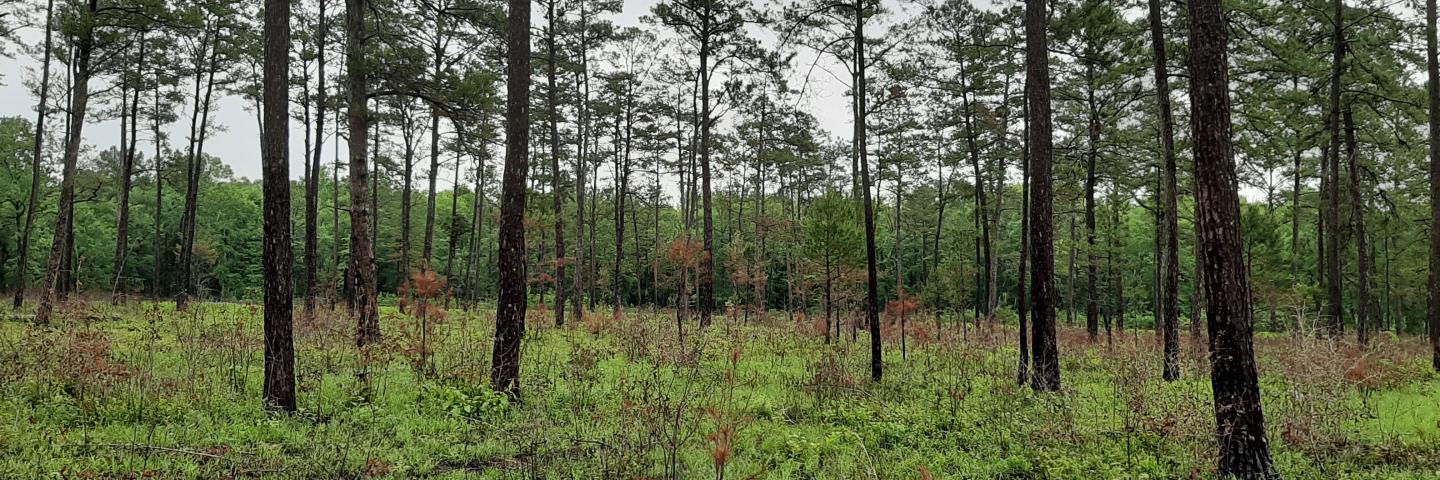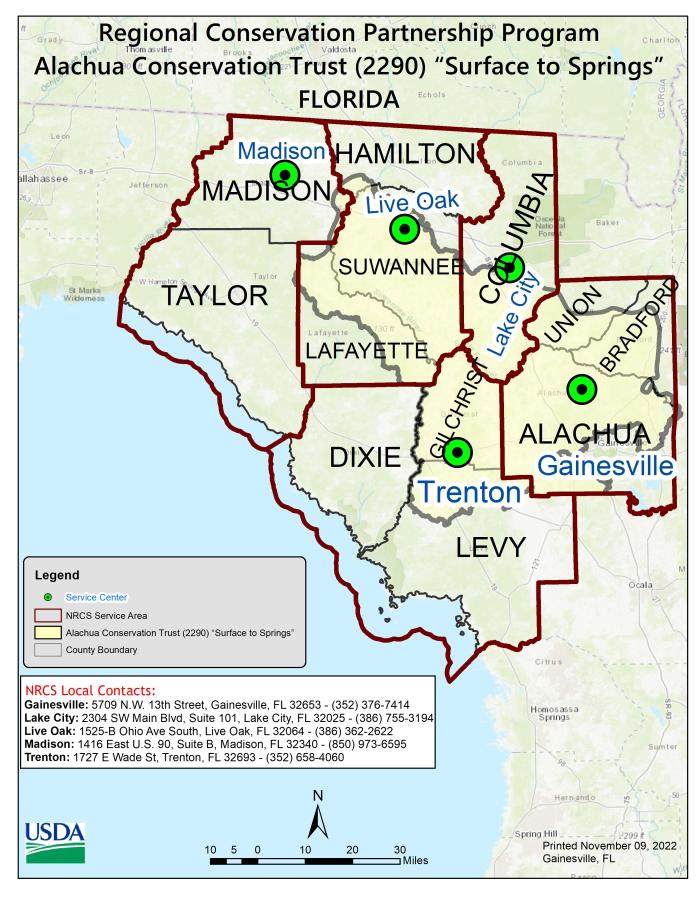
The Surface to Springs RCPP project covers approximately 25 percent of Florida’s springs and targets a critical geography threatened by high producer land conversion.
Lead Partner: Alachua Conservation Trust
Contributions from project partners will complement RCPP funding and protect additional lands as part of the overall initiative. Targeting tools will prioritize critical lands and conservation easements will be coupled with forest management plans and funding for forest restoration and enhancement activities.
Project Scope/Description:
Alachua Conservation Trust’s (ACT) Surface to Springs RCPP covers approximately 25 percent of Florida’s springs and targets critical areas of Florida that are threatened by high producer land conversion. The flexibility of an RCPP allows for the opportunity to innovatively combine aspects of the NRCS Agricultural Conservation Easement Program to key lands that may not fit neatly under specific program rules. Surface to Springs shines a light on a unique and important part of Florida that contributes greatly to the general wellbeing of the state’s economy and safe drinking water supply.
This project has two major impacts for Florida’s springs and ground water: (1) catalyze existing partner groundwork to set a regional precedent for protecting rural producer lands in this sensitive area with entity held conservation easements; and (2) reduce nutrient inputs and water use through management activities on producer lands. Using innovative models and evaluation tools, ACT and partners will protect land and aid farmers in safeguarding family legacies to secure water resources through land management appropriate for this sensitive area.

Nationally, Florida has one of the most unique watershed features – freshwater springs. These springs are of critical importance both ecologically and as a direct conduit to the Floridan Aquifer, an underground limestone waterway that extends 100,000 square miles with over 1,000 springs across Florida providing water for the state’s residents,
producers, and tourists alike. The springs and their associated watersheds are directly impacted by land use, development and practices implemented by producers in the region. Many state agencies, nonprofits, and universities have identified substantial threats to the system that, if unaddressed, will result in the collapse of the system and the state’s drinking water. The same organizations have identified pathways forward to resolve the over-pumping and nutrient loading of the spring systems, and all have concluded that permanent landscape conservation, prevention of land intensification, and an improved management, enhancement and restoration of properties are critical solutions to protect Florida’s drinking water.
For the past 32 years, ACT work has been integrally tied to the watershed health of North Central Florida. Based on ACT’s work in the region, we have identified a demand for land conservation programs, specifically to purchase conservation easement and assist with management, enhancement, and restoration of properties that exceed current capacity. Together with our partners, ACT has secured financial assistance to provide cost-share for purchasing entity held conservation easements, as well as technical assistance to work directly with property owners and evaluate the impact of the easements. This secured source of financial and technical contributions paired with the unmet demand of landowners with key properties to protect and improve the water quality and quantity of the region, directly compliment NRCS’s ability to work with eligible landowners.
ACT’s impact through Surface to Springs will accelerate protected lands through entity held conservation easements, increase technical assistance to landowners with key importance to the protection of springs and Florida’s drinking water and connect landowners with the tools and resources to move forward with best management, enhancement and restoration strategies to benefit the region. The implementation of these programs will be centered on key parcels within the proposed RCPP footprint that directly contribute to water resources, as well as wildlife habitat for native species.
Goals and Objectives:
The Surface to Springs footprint is well known among state, local, and federal partners for being a critical geography that holds approximately 25 percent of Florida’s springs – direct conduits to the region’s drinking water. Full of agricultural and producer lands, this rural economy is facing high threats of land conversion and development. This RCPP project allows ACT, together with NRCS and 12 partners, to implement Farm Bill programs with key landowners that have critical connections to the region’s water resources. It also allows greater flexibility for landowners with forested and/or grassland properties to enroll in NRCS programs, amplify partner investment with a close to 2:1 match, and provide landscape impact to a highly sensitive and unique region while using innovative approaches for regional environmental outcomes. Surface to Springs will focus on implementing entity held easements and land management/improvement/restoration activities to benefit water resources, quality, and quantity for springs and drinking water.
Project goals include:
- Permanent Land Protection: 9,000 acres of entity held easements over five years.
- Land Improvement and Management Enhancements: these restoration/management projects will result in improvements and enhancements for wildlife habitat and water quality and quantity on 2,000 acres of land.
- Quantifying Contributions to Water Quantity/Quality Enhancements: make property-level recommendations for management/land use scenarios and create an evaluation report to create economically viable alternatives for water improvement at the property scale; and,
- Promote Best Management Practices.
Priority Resource Concerns:
- [ACT Resource concerns to be added soon.]
Project Partners:
Alachua Conservation Trust
Alachua County
Ecohydrology Lab - University of Florida
Florida Farm Bureau Federation
Florida Fish and Wildlife Commission
Florida Forest Service - Florida Department of Agriculture and Consumer Services
Florida Forestry Association
Howard T. Odum Florida Springs Institute
Howard T. Odum Center for Wetlands-University of Florida
National Wildlife Federation
Suwannee River Partnership
Suwannee River Water Management District
U.S. Fish and Wildlife Service


